 Dr. Ken Saag, 2022 ACR PresidentKen Saag, MD, MSc, delivered a stirring presidential address at the American College of Rheumatology annual meeting in October 2022.
Dr. Ken Saag, 2022 ACR PresidentKen Saag, MD, MSc, delivered a stirring presidential address at the American College of Rheumatology annual meeting in October 2022.
While COVID-19 continues to pose special risks to immunocompromised patients, he said, it is beginning to feel as though the field is entering a phase beyond the pandemic, which brings new challenges.
“We now see non-clinical work as less constrained by time and space,” he said. “Many of our administrative and research staff and faculty, particularly in our academic, industry and government centers, view at least partially remote work as a key job benefit. While this no doubt improves work-life balance for some, it’s led to a stifling of the water-cooler discussion, which has challenged our ability to innovate.”
The Great Resignation has brought on a need for hiring quality new staff, “who have been very tough to find,” he said.
The ACR is situating itself to meet these challenges, he said. The structure of Board of Directors meetings now encourages “more intimate discussions.” And new ACR membership models will allow for small teams of healthcare providers to join. Live meetings will continue to be complemented by virtual options to encourage maximum attendance.
The RISE registry will continue to help with research, he added, indicating it now includes data equivalent to 3 million patients and 30 million visits.
The top challenge may be the rheumatology workforce shortage, with an estimated 40–50% of current U.S. rheumatologists expected to retire in the next 10 years, leading to a 25% reduction in the workforce.
“This constitutes an existential threat to our care for an increasing number of patients, resulting, in part, from a global silver tsunami,” Dr. Saag said. An ACR Workforce Solutions Committee is working on solutions to grow and sustain this workforce.
Burnout, limited interactions of trainees with scientists, demoralized scientists due to lost funding, and debt that limits career choices are all reasons for workforce shortages and low numbers of physicians doing scientific research, he said.
“Simply put, we need more funding, but in particular we must support those doing team science and translational research of greatest public health relevance,” he said.
The ACR is also working on diversity, equity, inclusion and accessibility issues with leadership development conferences, an ACR Convergence reception for under-represented medical professionals, and a new ACR subcommittee and diversity director, he said.
“We need to be a more representative specialty to enhance trust,” he said.
Rheumatologists also play a role in helping to dispel the mistrust of science that blossomed during the pandemic. Dr. Saag said the College’s positions should be science based and not veer too far into the political.
“When society takes a wrong turn, and medical professionals go along, mistrust in medicine grows,” he said.
“Express your true opinions—if I can get my reticent patients in Alabama to take badly needed COVID vaccines, trust does matter. And our trusted expertise influences our patients’ actions,” he said. “Our lane, and the lanes of other medical organizations, are widening, and the ACR cannot and should not shy away from controversy. We should be doing this while representing our members fairly.”
Despite the challenges to medicine and science over the past three years, Dr. Saag remains optimistic about the future of rheumatology. He looks forward to working with his successor and ACR elected leaders to forge new paths to improve the quality of life for patients with rheumatic diseases.
This article appears courtesy of The American College of Rhreumatology.